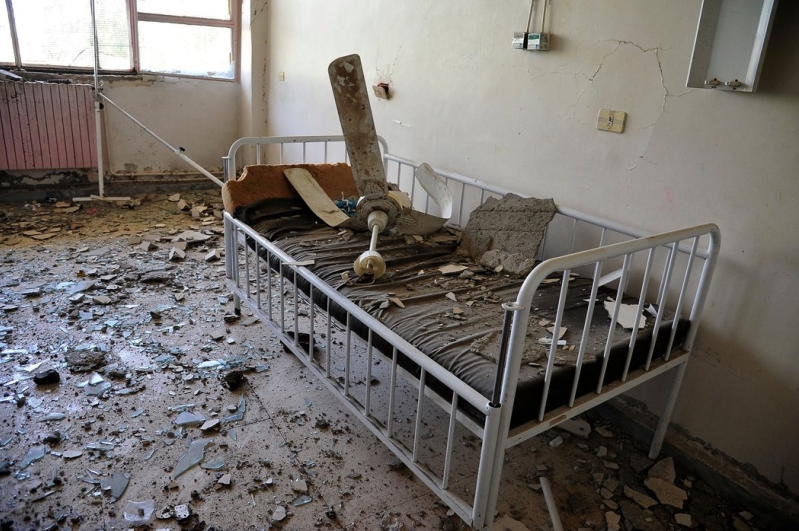
As East Aleppo's last-standing hospital was torn down last month, access to food and medical rations completely cut out, and supplies running dry, a heartbreaking letter from a Red Cross doctor took the world by storm as it echoes the desperate first-person sentiments of someone working on the front line.
Amidst the crossfires, the letter made its way to BBC's office.
The still unidentified doctor shares in the letter:
Working as a doctor for the International Committee of the Red Cross (ICRC), I have seen many things in Syria during the past five years. But nothing like this.
We'd tried to reach the centre the previous day, but couldn't get the necessary security guarantees. The fighting had been too intense. Three people at the centre died during that time.
Now we'd got permission to go to the former old people's home, which had become a refuge for around 150 people, some disabled, some mentally ill and the rest just desperate people with nowhere else to go.
We, the Syrian Arab Red Crescent and the ICRC, were there to take them out of eastern Aleppo.
It was already going dark as we drove into the narrow streets of the Old City. I'd known the area before the war, a thriving, bustling place.
Now, it was a sea of rubble. I couldn't recognise streets, never mind buildings. A ghost town of smashed concrete. An end of the world place. Like a fury had swept through.
Gunfire rattled in the distance but here there was no noise, no people.
We had to walk the last bit that vehicles couldn't pass.
In the midst of the landscape, two crumbling buildings. One building for the men, one for the women.
We entered the yard. A group of patients sat huddled round an open fire. They had few clothes and were shivering. Many looked bemused. They were very near to each other, pushing their shoulders together, looking around, trying to reassure one another.
To one side, there were bodies, maybe around 10 of them.
I knew the man who ran the centre and we found him. We learnt that he'd lost his entire family three days earlier: among them, his wife, son and grandson. He'd brought his family here because he thought no-one would attack the centre.
Some of the bodies in the yard were members of his family.
As darkness closed in and temperatures dropped further, we had to move fast. We identified those who needed help most. As we worked, an old man died in front of us from the cold.
No medicines. No heating. No fuel to cook the food.
I checked a few nearby buildings to see if there were any other people. There weren't.
But there was another body. We could see it, but it was trapped under a collapsed building. We couldn't do anything about it.
The evacuation was not simple. Many, especially those with mental illness, didn't want to leave. They were confused, helpless. They didn't realise they were living in a war zone.
Some had been living there for four or five years. They knew nothing else. "We have no other relatives, we have nowhere else to go." Some said they'd prefer to stay.
And then some soldiers arrived. They brought six children with them. They'd been found among the rubble, lost, helpless. The oldest was a seven-year-old girl, the youngest a seven-month-old baby boy. They hadn't eaten for two days.
They'd all just become orphans, their parents killed by a bomb during the past few days. They had nothing, and no-one. What can you say? What can you do?
At the centre, 18 people wanted to stay behind. Because they had nowhere else to go.
I hope we can get back soon to bring them some help.
Another chapter in a god-awful war.
Those people paid the cost of this terrible war which they had nothing to do with and did not decide to be a part of. They were the most vulnerable of the vulnerable. And no side protected them.
This is not about who is right, or who is wrong. Who is winning, who is losing. This is about people: flesh and blood, human beings. Bleeding, dying, being made orphans, every day.
I feel so very sad, today. Please, there have to be some limits to this war.
This is not the first time frontline doctors have sent their appeal for help. Last August, the last 15 doctors serving in Syria sent a plea of rescue to US President Barack Obama. At that time, 42 attacks were made on the remaining hospital facilities.
Dr. Mazen, a 55-year old Syrian orthopedic surgeon who's been working with Médecins San Frontières (MFS)/ Doctors Without Borders, says, "Our hospital was reduced to rubble, and so was my heart."
As of last count, more than 750 medical workers have died while on duty. A few months after this report was released, another five medical workers were killed in an air strike. For MFS, this is not just a Syrian meltdown, but also an act of "humanitarian catastrophe."
Dr. K, a surgeon who also works for MFS, says, "Why do I keep on with this (work)? Because if I leave, nobody else will care for the sick. I've had multiple threats but I've managed to escape so far because I've had friends who warned me."







